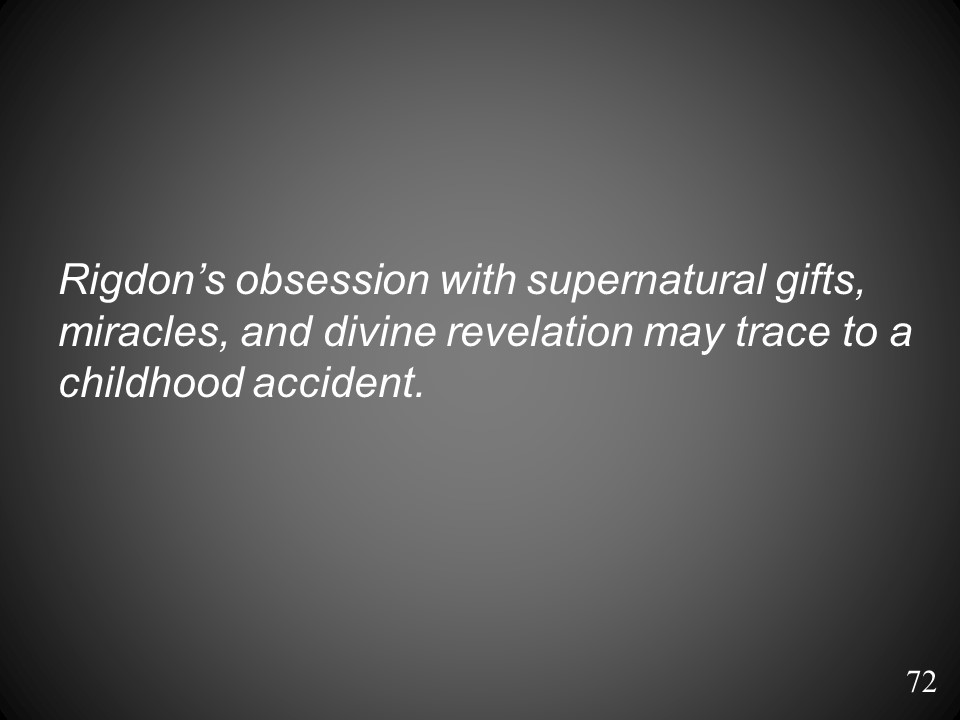Rigdon’s interest in “gifts of the Spirit” is understandable. He was susceptible to delusional thinking and deranged episodes, including seizures, fits, and fainting spells. He interpreted these episodes as manifestations of the spirit, evidence of a divine calling. This is consistent with the account of Loammi Rigdon, a physician and Sidney’s next older brother, who attributed Sidney’s behavior to a childhood head trauma that resulted when he was thrown by a horse and dragged with his feet caught in the stirrups.
“He [Rigdon] brought to his aid (in preaching while still a Campbellite preacher) the eccentric and grotesque workings of a nervous and enthusiastic temperament, which at times threw him into spasms and swoonings, similar to those nervous agitations which have so often prevailed, not only in individual instances, but raged as epidemics both in and out of the churches. These nervous fits he interpreted into the agony of the Holy Spirit as multitudes had done before him, and contended that the miraculous spiritual gifts of the apostolic age were now about to be restored to the church.” * Turner: op. cit., pp. 24-5.
Rigdon recorded many revelations from God and from mythical dead people using the first person voice. Example: The Book of the Revelations of Jesus Christ to the Children of Zion (1868). Section 86 – ministering of Phin’s Phineas the angel high priest to his son and descendant.
“Behold I am Phineas the son of Eliezur who was the son of Aaron, and according to the law and power of the holy priesthood, which priesthood has power as ministering angels, when they maintain their priesthood in the flesh during all their fleshly existence in purity. I Phineas being of the high priesthood and having been adjudged by the courts above as one who had honoured the Holy priesthood during all my days I obtained the privilege and power of ministering to those in the flesh who had obtained & were consecrated to the priesthood…”
Rigdon also spoke as God about himself (in quite flattering terms). Section 26 of The Book of the Revelations of Jesus Christ to the Children of Zion (1868):
“Behold saith the Lord it is my will that the Children of Zion should understand the character of the salvation which has come to them through the ministration of those whom I the Lord have chosen. Therefore I the Lord say to all the Children of Zion that I the Lord their God chose my servant Sidney to be the head of Zion even before he was born and he was mine from his mothers womb. I the Lord his God watched over him from his cradle to the present moment. The integrity of his heart I knew. The honesty of his soul was always before my eyes long before I sent him the fullness of my gospel. For him only did I behold among the sons of men whose intension of soul & purposes of heart were such as to warrant the Lord your God in chosing him for this high and holy calling. I the Lord made him mighty in the earth among the great ones thereof from the beginning. Even in his youthful days I made him one to be wondered at. As he advanced in life I made him a terror to those who opposed him, until his name became famous in the midst of the great ones of the earth.”
In 1830, Rigdon attended the annual Mahoning Baptist Association meeting in Warren, Trumbull, OH, and became embroiled in a controversy with former mentor Campbell. According to Hayden:
“Rigdon introduced an argument to show that our pretension to follow the apostles in all their New Testament teachings, required a community of goods; that as they established this order in the model church at Jerusalem, we were bound to imitate their example.”
http://mun.ca/relhayden/restmov/texts/ahayden/ehd/EHD13.HTM
Here is another account of the same meeting, given by Almon B. Green:
“In the annual meeting of the Mahoning Association held in Austintown in August, 1830, about two months before Sidney Rigdon’s professed conversion to Mormonism, Rigdon preached Saturday afternoon. He had much to say about a full and complete restoration of the ancient gospel. He spoke in his flowing style of what the Disciples had accomplished, but contended that we had not accomplished a complete restoration of the Apostolic Christianity. He contended such restoration must include community of goods – holding all in common stock, and a restoration of the spiritual gifts of the apostolic age. He promised that although we had not come up to the apostolic plan in full yet as we were improving God would soon give us a new and fuller revelation of his will. After the Book of Mormon had been read by many who heard Rigdon on that occasion, they were perfectly satisfied that Rigdon knew all about that book when he preached that discourse. Rigdon’s sermon was most thoroughly refuted by Bro. Campbell, which very much offended Rigdon”
http://thedigitalvoice.com/enigma/wrw/1977DavD.htm#pg091a
(Also cited in Cowdery et al., 2005, p. 313)
“This [Alexander Campbell’s denunciation of Rigdon’s plan] put an end to it. Rigdon finding himself foiled in his cherished purpose of ingrafting on the reformation his new community scheme, went away from the meeting at its close, chafed and chagrined, and never met with the Disciples in a general meeting afterward. On his way he stopped at Bro. Austin’s, in Warren, to whom he vented his spleen, saying; “I have done as much in this reformation as Campbell or Scott, and yet they get all the honor of it!”
